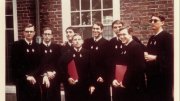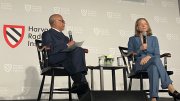On Thursday, the Harvard Radcliffe Institute announced its 26th class of Radcliffe Fellows. One of Harvard’s most prestigious fellowships, the Radcliffe Fellowship offers an opportunity for scholars, scientists, artists, and writers to pursue projects with research and faculty support. As the value of academic research at Harvard and across higher education is increasingly called into question, these fellows’ proposals—from strategies for reducing ethnic violence to searching for a super-Earth—reflect Harvard’s commitment to supporting scholars who engage in deep reflection and study.
This year, out of nearly 1,700 applicants, around 50 fellowships were awarded. Eleven fellows will focus on climate-related projects, including two Radcliffe-Salata Climate Justice Fellows. These initiatives address pressing global concerns, from the disproportionate impacts of extreme weather on U.S. immigrant workers, women in Southeast Asia, and the greening of Arctic regions.
Rachel Morello-Frosch, of the University of California, Berkeley, will study how certain climate change policies—including retiring fossil fuel plants, reducing oil and gas development, and implementing nature-based clean-energy solutions—can have health and equity benefits for society at large. Her fellowship is supported by the Patterson Catalyst Fund for Climate. Another Radcliffe-Salata fellow, sociologist Diana Hernández, will examine how “place-based” interventions can bolster the health of economically disadvantaged populations. Her work is supported by the Jackson Fund for the Future Climate.
As habitat loss and deforestation expand throughout many parts of the world, Beronda L. Montgomery, a professor of biology and medical science at Grinnell College, will explore the symbiotic relationship between trees and people in her forthcoming book When Trees Testify. Montgomery will be the 2025–2026 Sally Starling Seaver Fellow.
Among the many fellowships awarded in the sciences broadly, Aaron Meisner, an associate astronomer at the National Optical-Infrared Astronomy Research Laboratory, will search for a hypothesized and yet undiscovered super-Earth. Meisner, the Pforzheimer Foundation Fellow, will be among the first scientists to use the world’s largest camera, at the Rubin Observatory in Chile, to scan the galaxy for a planet more massive than Earth but lighter than ice giants like Neptune.
In the social sciences, Dillon professor of international affairs Melani Cammett, director of the Weatherhead Center for International Affairs, will examine why some communities emerge from ethnic violence with strengthened interethnic ties—and how political leaders can make or break the healing process. Cammett will be this year’s Grayson Fellow. Journalist Mya Frazier, the Padnos Fellow, will investigate how the credit scoring system has created a new permanent underclass in the United States.
In the arts and humanities, Elizabeth Otto, professor of modern and contemporary art history at the University at Buffalo, will explore the relationship between the Nazi regime and the German Bauhaus art movement from 1919 to 1933. As the Gellert Fellow, her research will draw on archives housed at Harvard’s Graduate School of Design, where Bauhaus founder and architect Walter Gropius was a professor.
Schlesinger Fellow Sam Huber, a lecturer in English at Yale University, will write the first full biography of feminist writer Kate Millett, a leader in second-wave feminism and the author of Sexual Politics (1970). His project will be rooted in archival research from Duke University, where some of Millett’s papers are kept.
“In these uncertain times, I am more convinced than ever that Radcliffe’s interdisciplinary approach is crucial to creating the transformative research, scholarship, writing, art, and, ultimately, societal change that we need,” said professor of history and Paul professor of constitutional law Tomiko Brown-Nagin, dean of the Harvard Radcliffe Institute.









